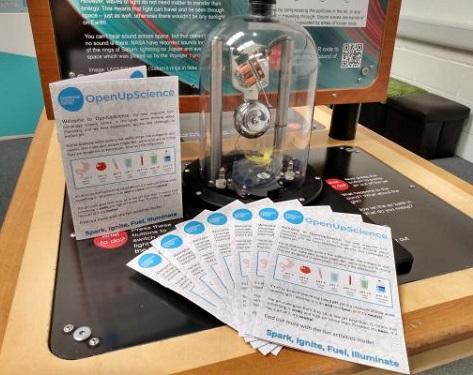The team at Cambridge Science Centre is very busy re-focusing their energies to different platforms beyond in-school and at the Science Centre. They continue to reach large numbers of young people across East Anglia by creating lively and hands-on initiatives, under the new heading of ‘OpenUpScience’.
In the past few weeks, the team has created a weekly magazine which features STEM-based facts, activities, quizzes, and challenges for children to do at home. Working closely with community groups throughout East Anglia, the magazines are distributed through social enterprises and food banks to reach children who may not have ready access to digital resources at home, or who may prefer a magazine format.
As a second thread to ‘OpenUpScience’, a new, 10-minute programme, Science@6, has launched on YouTube and through social media. The programmes, shown every Monday at 6pm, are a mix of fun STEM activities to do at home, competitions, quizzes and guest appearances with the Presenter in the Centre. Themes are linked to those promoted weekly via the Centre’s social media channels.
CEO, Helen Slaski said: “Engagement will not be the same for everyone without the structure of the school day, particularly for children who do not have resources or strong family support. When they return to school, children are likely be at very different points from where, under normal circumstances, they would expect to be and, crucially, from one another. There is a growing disparity in educational “wealth” which will increase by the day without intervention.
"Whilst we can’t engage directly with our audiences, we still have the key ingredient behind our engagements – our science communicators. The switch to digital media has been intense and immediate across all areas of education so we are aiming to do something slightly different, filling in gaps in engagement and ensuring our STEM is interactive and fun.
"Our first three editions of the magazine reached around 3,000 children in our local Cambridge area and as far afield as North Norfolk, Essex, and Suffolk.
"Science@6, being entirely online is a completely different way of working for us. Our team of professional science communicators have brought together a ten-minute video programme quickly and with fantastic results. I could not be more delighted with the launch of the programme, which offers us a new way to connect with our audiences.”
Schools and teachers have not been forgotten. The VirtualSchoolTrip is a video-based ‘lesson’. offering students, a change from the norm and challenges to spark experimental thinking. Teachers registering to receive TheVirtualSchoolTrip are able to use these as part of their lesson plans. Designed to be done at home with whatever is available, students learn to consider fair testing, innovative design, and data collection. To date, just under 17,000 primary school age students have been registered to view TheVirtualSchoolTrip.
In addition, Cambridge Science Centre say they have more new initiatives to come, working to ensure the journey back to the “new normal” for many young learners will not be so difficult.
